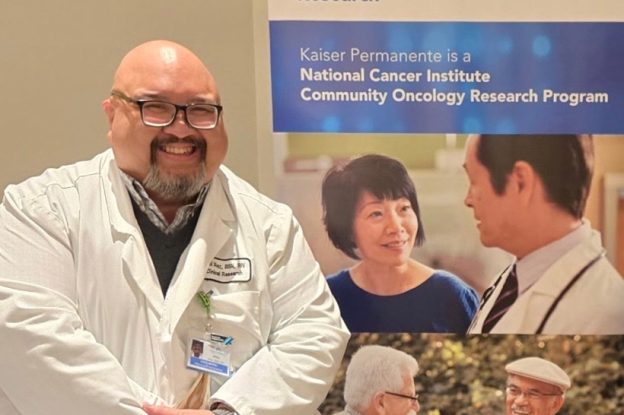
Finding a truly satisfying specialty in research
*Third in a series highlighting research nurses during Nurses Week 2025*
Noli Raz, RN, works at the Kaiser Permanente Irvine Medical Center with the CCTAP (Cancer Clinical Trials Access Program) team. He began his health care career more than 30 years ago as a phlebotomist at the Kaiser Permanente Anaheim Medical Center, where he worked closely with nurses. The compassion and dedication they demonstrated with their patients made a strong impression on him, inspiring him to pursue a career in nursing.
When he shared his dream with a colleague, she encouraged him, recognizing that his strong work ethic and patient care skills would help him to become a great nurse.
After Noli graduated from nursing school, he was offered a job in the ICU at UC Irvine Medical Center. While there, he learned of an opportunity for a nurse in a research clinic. Intrigued by the possibilities, he applied for the position.
The role opened many doors for him, as he later worked in several different clinical areas of research, including cardiac, dermatology, rheumatology, diabetes, and neuropsychology. Eventually, he moved to oncology research, where he has now worked for about 10 years.
On any given day, Noli addresses patients’ concerns and tells them about possible adverse effects of participating in trials. He serves as an advocate during study office medical visits and provides emotional support. He works with the site oncologist with recruitment, enrollment, and managing the overall flow of studies. Noli also communicates with sponsors about participant recruitment, enrollment, and retention.
“Although oncology is the most challenging area of research I had ever worked in, I fell in love with the specialty and continue to grow all the time in my role as an oncology research nurse,” Noli said.
One of many memorable moments of joy he has experienced working in oncology came when he volunteered to represent Kaiser Permanente research at an event for the Leukemia & Lymphoma Society where he showed patients how to access oncology clinical trials.
At the symposium, he ran into a former colleague whose husband had been diagnosed with leukemia. The couple was not aware that Kaiser Permanente conducted clinical trials, so educating them about potential research possibilities was tremendously satisfying.
He has also found job fulfillment by serving on clinical research teams. He believes having nurses on teams greatly enhances participants’ experiences as they bring compassionate, patient-centered perspective to the process.
He thinks nurses are especially adept at communication, which helps patients feel more understood, supported, and comfortable. Nurses can also explain complex medical information in relatable terms, further benefiting patients.
“These contributions not only improve patient satisfaction but also build trust with participants, which can lead to better engagement and more meaningful outcomes in trials,” Noli added.





